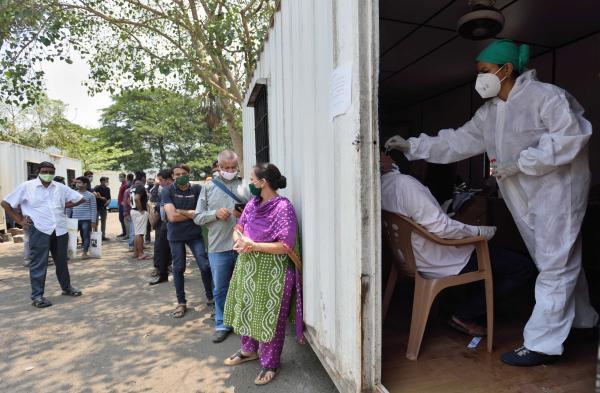
- EIB President announces emergency EUR 250,000 donation from EIB to support India cope with COVID-19
- EIB and SBI launch EUR 100 million sustainable private equity initiative
- EUR 300m backing for Kanpur and Pune metros to benefit millions of commuters
Werner Hoyer, President of the European Investment Bank announced today an emergency EUR 250,000 donation from the EU Bank`s own funds to India in response to the escalating COVID-19 crisis. The donation will go to Unicef Luxembourg, Red Cross International and Malteser International to acquire life-saving equipment in particular to improve access to oxygen including oxygen generation plants as well as the procurement of oxygen cylinders urgently needed across India.
The donation will also help reinforce key emergency services such as ambulances, blood supply and a 24/7 helpline, also stepping up communication and awareness campaigns to address misinformation on COVID-19 immunisation.
President Hoyer opened the signature ceremony for three new EIB-backed sustainable investment projects. The EIB and its Indian partners the State Bank of India and the Ministry of Finance signed EUR 300 million investments in urban metro systems in the cites of Kanpur and Pune, and a EUR 25 million investment in NEEV II, an equity fund set up to support small and medium businesses in India with innovative solutions for climate action.
The signatures took place ahead of the EU-India leaders meeting in Portugal this week, with Francisco Andre, Secretary of State of Foreign Affairs and Cooperation attending on behalf of the Portuguese Presidency of the Council of the European Union.
Werner Hoyer, President of the EIB said: “The European Investment Bank stands by India during these challenging times and our donation is a sign of solidarity and support. The EIB as the EU Bank is ready to strengthen cooperation with Indian partners to tackle the pandemic and recover as quickly as possible. Five years ago, Prime Minister Modi called upon the EIB to accelerate support for high-impact sustainable transport investment and climate across India. Today’s new agreements will further support transformation of urban mobility for millions of commuters through the construction of new world-class metro networks in Kanpur and Pune. Our new cooperation with the State Bank of India, through the innovative NEEV II fund, will unlock EUR 100 million of sustainable business investment by companies across India. As outlined by the new EIB-International Solar Alliance study on off-grid solar, visionary and ambitious long-term public and private investment and sharing best-practice is key to strengthening India’s green recovery from COVID-19.”
Francisco Andre, Secretary of State of Foreign Affairs and Cooperation of Portugal, said: “I am honoured to witness the signature of these three important projects which further solidify the relationship between the European Union and India. This partnership of the two largest democracies in the world will be key to successful post COVID-19 recovery of the global economy and success of global climate action. The Portuguese Presidency of the Council of the EU has had an excellent cooperation with the EIB. We worked together on accelerating green investment in Africa and today we continue to demonstrate the power behind Team Europe and deliver tangible support for sustainable, green transport and innovative investment in the green transition across India”
EU Ambassador to India Ugo Astuto stated: “Climate action and environmental sustainability are the need of the hour to save our planet. Climate change and the green transition will also be key priorities at the upcoming EU-India Leaders Meeting. The EIB has been investing in sustainable infrastructure in India for over 25 years. This latest funding will further strengthen our cooperation with India and help the private sector to develop innovative solutions to tackle climate change.”
Green, safe and reliable public transport for India
The European Investment Bank and the Ministry of Finance of India signed EUR 300 m for the construction of new metro lines in the cities of Kanpur and Pune. To date, the EIB has invested EUR 2.6 billion in urban metro systems in Bhopal, Kanpur, Pune, Lucknow and Bangalore.
In addition to creating affordable and accessible public transport and a reliable alternative to heavily congested streets, the two new metro systems will reduce pollution and greenhouse gas emissions and improve air quality in Pune and Kanpur. With easier access to the local job market, healthcare and education for residents, the EIB-supported metro rail systems will have a positive impact on business and quality of life, while also increasing safety and social and economic mobility for female travellers.
The new EIB financing builds on successful progress on the two projects using initial EIB financing agreed in 2019.
New EIB – SBI partnership to back EUR 100 million of sustainable business investment
The EIB and the State Bank of India signed a cooperation agreement to support EUR 100 million of clean energy, energy efficiency, water and circular economy investment by Indian business through the new NEEV II investment fund.
The initiative will be managed by SBICAP, a subsidiary of SBI, and will allow innovative and growing Indian companies to use equity finance to accelerate sustainable investment and climate action.
About the EIB in India:
Since the beginning of its operations in India in 1993, the European Investment Bank has supported 26 projects in the country and invested close to €3.3 billion in transport, energy, agriculture, fisheries and forestry projects as well as India’s small and medium enterprises.
About the EIB in Asia:
For 25 years, the European Investment Bank has supported economic development in Asia and the Pacific region. The projects we help finance make people’s lives easier – from cutting travel times in Bangalore with a new metro line, to providing cheaper, cleaner energy to western Nepal.
In Asia, we have chosen to focus our lending on climate action across all sectors. We also work to include gender equality in our projects, ensuring that women, men, girls and boys can benefit from projects equally and equitably.